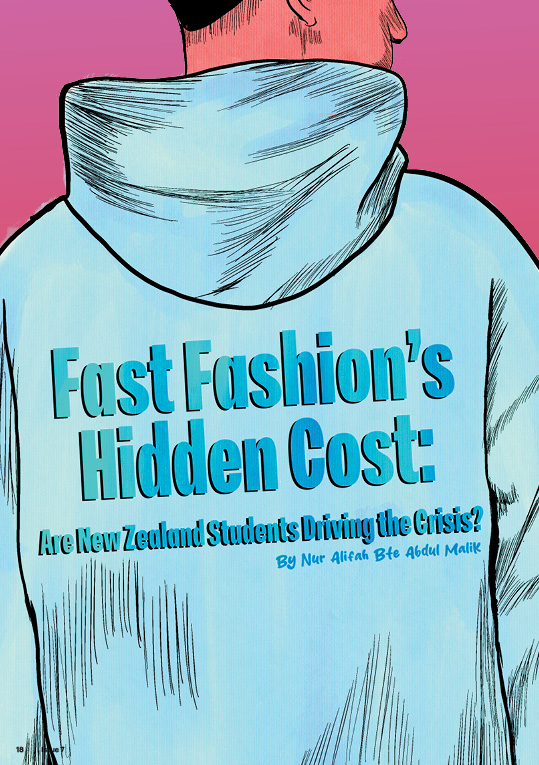
Fast fashion is no longer just a trend in New Zealand, it is a full-blown phenomenon, reshaping how students dress, shop, and consume. Social media and celebrity culture increasingly influence many young people, resulting in a cycle of rapid purchases and disposals. This shift not only impacts personal style but also raises significant concerns about sustainable and ethical production practices within the fashion industry. From late-night scrolling through Temu and Shein to impulse buys on AliExpress and Boohoo, ultra-cheap clothing has never been more accessible. With a few taps on a phone, students can revamp their wardrobes overnight, lured by the promise of stylish outfits at unbeatable prices. Fashion cycles that once spanned seasons have now condensed into weeks, fuelling an endless loop of buying, disposing, and replacing.
But behind the thrill of a bargain lies a troubling reality. New Zealand landfills overflow with more than 220,000 tonnes of textile waste each year, much of it poorly sorted and shipped to Global South countries, where it exacerbates pollution and waste mismanagement. The seemingly innocent desire for affordable clothing masks an industry built on environmental degradation, exploitative labour, and a culture of disposability. The true cost of these garments is not reflected in their price tags, it lingers in the mounting waste, the exploited workers, and the unsustainable demand for more.
Scroll through Instagram or TikTok, and it will not take long to see why fast fashion has such a firm grip on students. Social media relentlessly churns out micro-trends, pressuring young consumers to refresh their wardrobes at an unsustainable pace. Influencers flaunt new outfits daily, fostering a mindset where clothing is no longer an investment but a disposable commodity.
A rising side effect of this culture is “thrift flipping” a practice where people scoop up second-hand clothing at bargain prices only to resell them for profit. What seems like a savvy business move actually strips affordability from those who truly need it, undermining the sustainability ethos of secondhand shopping.
Simultaneously, fast fashion giants engage in deceptive greenwashing, inflating their sustainability claims while persisting in environmentally harmful practices. Many students want to make ethical shopping choices, but the stark reality is that truly sustainable fashion often comes with a hefty price tag, one that many simply cannot afford. The irony is that sustainability, while marketed as a necessity, has become a privilege.
If New Zealand’s universities want to take sustainability seriously, they need to step up. While institutions such as the University of Auckland and Victoria University of Wellington have made strides in researching sustainable textiles and other activities to raise awareness of the consumerism of fashion, at the University of Waikato, we still have no visible initiatives in upcycling workshops and clothing swaps. Although thrift shops such as Rewind Clothing provide alternatives to purchase second-hand clothing and the accessibility of donations to Hospice in the Waikato Region, many students remain unaware of how to incorporate sustainable fashion into their everyday lives.
Universities should take the lead in reshaping fashion consumption habits. Imagine campuses hosting vibrant clothing swap events where students exchange outfits instead of constantly buying new ones. Sustainability courses embedded within environmental and business programmes could help educate students about ethical fashion choices. Partnerships with local ethical brands could make sustainable shopping more accessible through student discounts while upcycling and repair workshops could extend the lifespan of clothing. See Sarah’s mending Darts & Crafts, issue 3, page 35. By making sustainability a part of campus culture, universities can instil long-lasting habits that challenge the throwaway nature of fast fashion.
But the responsibility does not only fall on students and universities alone. The government has a crucial role to play. While fast fashion contributes to the economy, its environmental cost is staggering. New Zealand could follow in France’s footsteps, where new policies aim to penalise brands for overproduction and waste.
One potential solution is introducing a fast fashion import tax, making it less attractive for consumers to purchase unsustainable clothing. Tax revenues could then be funnelled into textile recycling programs and initiatives that support ethical, locally crafted fashion. At the same time, stricter regulations should require fashion brands to be transparent about their supply chains, carbon footprints, and waste management strategies. Without policy intervention, the cycle of mass consumption and waste will only continue.
The power to drive change is in students’ hands. While individual actions may seem small, collective efforts can send a powerful message to the industry. Choosing to support local ethical brands over fast fashion retailers, making second-hand and upcycled clothing mainstream, and holding brands accountable through petitions and advocacy can create ripple effects across the industry.
Fast fashion thrives on demand, however, we as students, can demand better sustainable actions by making conscious choices and pushing institutions and policymakers to act, as they can lead New Zealand toward a future where fashion is no longer a crisis but a conscious and sustainable movement in our living conditions.